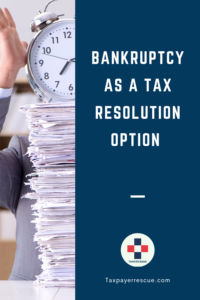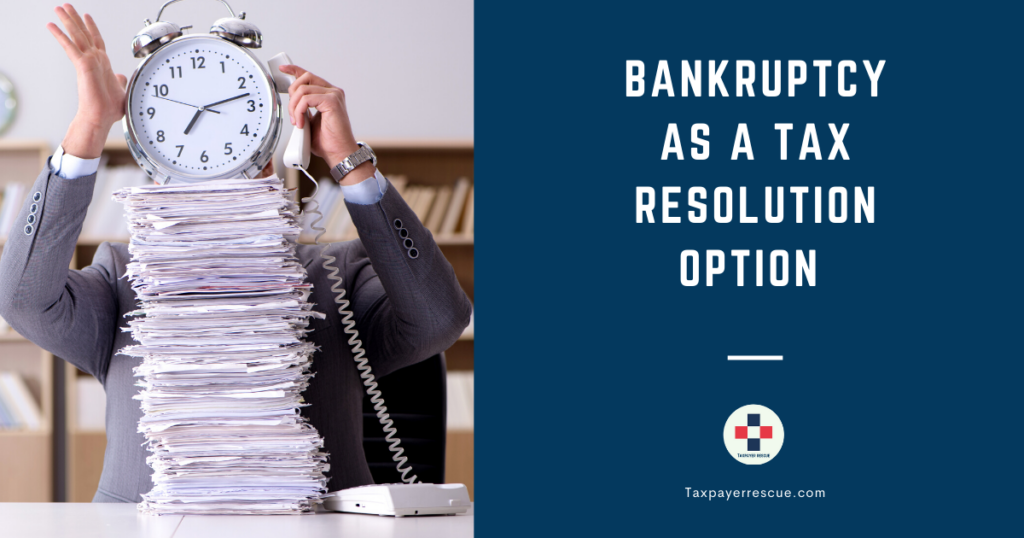Bankruptcy is not always in the mind of a taxpayer when it comes to a tax resolution. Most taxpayers believe they can find a way to resolve their tax debt. They see commercials promising “cents on the dollar” settlements without knowing how things work in reality.
Bankruptcy Can Offer More Than Tax Resolution
It is not uncommon to find taxpayers overwhelmed with other debts. Their credit cards are maxed out. Medical bills are catching up with them and now even minimum payments are too much. That person is overextended and bankruptcy may be the only solution to the problem.
But How Does Bankruptcy Work In General?
Bankruptcy allows for the complete liquidation and/or reorganization of debt. The debtor will list all the debts in their bankruptcy paperwork, i.e. schedules. A Trustee is then assigned to their case and this person will oversee the case and any issues with compliance.
The Trustee will also work on trying to get non-exempt assets to pay creditors if available. Once all the assets are accounted for and sold (if not exempt), then the Trustee will distribute the funds. After that, the debtor receives a discharge.
Chapter 7 v. Chapter 13
We will focus on Chapter 7 and Chapter 13 for the purpose of this post. But there are several Bankruptcy chapters and each provides certain relief for certain debtors. For the most part, Chapters 7 and 13 are the most used for the average person.
Chapter 7 is the liquidation bankruptcy. It is a quick process where you can get rid of most of your debt with a few exceptions. Some of the exceptions are student loans, HOA fees, and certain obligations like taxes. I will explain that in a minute.
Chapter 13 is the reorganization bankruptcy. This type of bankruptcy allows the debtor to get of some if not most of their unsecured debt while taking care of important obligations like taxes. Other things you can take care of in a “13” is catching up with a late mortgage or car payments, and certain tax debts while protecting assets. ‘
How Do I know Which Chapter Applies to Me?
The way to find out which chapter you fall into is through a “Means Test“. Yes, it is also a “mean” test because the calculations are based on impersonal charts provided by the IRS. And these charts follow the income and expenses expected in your state. They don’t always match your reality for expenses. But this is what attorneys use to determine if you are a “7” or “13”.
Most debtors wish they can file a Chapter 7 because it is a quick process and you mostly don’t pay any creditors back (unsecured non-priority creditors). Others need a Chapter 13 to save their primary home and may not qualify. It is a tough process but one that can help in times of need.
Once your chapter is determined, then the work begins to see what you can discharge and what you get to keep through exemptions. These exemptions protect certain assets from being sold to pay creditors. One main example of an important exemption is the homestead exemption. How much you can protect will depend on the exemption statute in your state. Click on the → exemption ← to see the one that applies to your state.
Bankruptcy As a Tax Resolution
There are many rules to get rid of your taxes through Bankruptcy. They are not always what the debtor wants to hear. But just being able to eliminate some interest and tax penalties can really make a difference for the taxpayer. Even if you can’t eliminate the main taxes owed. This could really help taxpayers to reduce some of their tax obligations. And it would allow the taxpayer to have an easier time paying those taxes that can’t be discharged.
If All Taxes Cannot be Eliminated, Why Should I Bother Filing for Bankruptcy?
As mentioned above, when you eliminate some penalties and interest and other unsecured debt, your tax resolution becomes a lot easier. Even if you cannot discharge all your taxes. You can free up some funds to pay what can’t be discharged.
Can I Know Ahead of Time Which Taxes I Can Discharge?
A good tax professional will be key to finding out which taxes you can eliminate. The rules for discharging taxes is very confusing but here are some of the rules for your information:
- You filed your taxes at least two years before filing your Bankruptcy
- Your tax debt is at least 3 years old
- The IRS assessed your taxes 240 days prior to filing your Bankruptcy. New assessments will reset the clock.
- You did not commit fraud or tax evasion
- Only income tax is dischargeable
There is More to All of the Rules Above But This Should Give You an Idea of Where to Start
The best approach is to consult a tax professional who will evaluate all your obligations to see if there are any options to solve your tax debt. If filing a Bankruptcy is one of those options, then you will know exactly which tax obligations you can eliminate.
Taxpayer Rescue offers a full-service tax resolution solution which includes an in-house bankruptcy attorney*. The attorney will have immediate access to your file and your tax professional. This ensures that you have all the tools you need to solve your tax matters without ever “leaving the house”.
If you have tried to settle your tax debt and were not able to reach a solution, call us now for an evaluation at 602-123-4567. You can also complete our contact form with details of your case → Contact Us or the sidebar form. A tax professional will be contacting you as soon as possible**.

*Bankruptcy cases outside of Arizona will be accepted on a case by case basis
**Disclaimer: We are a debt relief agency. We help people file for relief under the Bankruptcy Code

